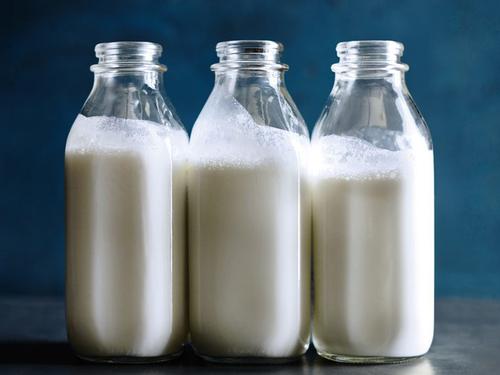Advantages and Disadvantages of Consuming Dairy Products on Regular Basis
We can all agree that drinking and consuming dairy products is something essential. During the first year we are born, we need mother's milk for development. According to USDA, dairy food group is essential to get all-important nutrients for overall health. However, there are numerous statements from certified health organizations that dairy products are not healthy. Eating dairy has become a controversial issue nowadays. Is dairy bad for you? Here we will present you both sides of the story.
Why Are Dairy Products Good for You?
1. Great Nutritional Value for Bones
Milk contains a wide array of micronutrients that you need to grow muscles while protecting your overall health.
The most important mineral in dairy products is calcium. You can find 28% of daily need in a single cup of milk. Calcium is essential because it protects your bones, teeth, and reduces the risk of getting osteoporosis and other bone conditions.
Vitamin D, which is also an essential vitamin that you cannot make inside your body, is also found in milk. This particular vitamin helps your body use calcium, and it protects eyes, skin while boosting your immune system.
Apart from these two nutrients, milk features a whole array of B Vitamins as well as Zinc, Selenium, and Magnesium. It's a superfood for your bones and will protect them due to a significant amount of calcium.
2. The Effects on Brain
It's enough to have one glass of milk each day, and you will boost the intake of important nutrients that we've mentioned above. At the same time, intake of milk can improve brain function and boost memory.
The best thing about it is the ability to reduce Alzheimer's disease risk in older adults due to great levels of glutathione that protects your brain cells from dying. Dairy products are a good source for substrates that will affect the glutathione synthesis inside the brain, which might initially protect you from developing Alzheimer's disease.
3. Helps You Build Body Mass
Due to high protein levels, you'll be able to use milk to build up muscles and create a greater body mass.
One cup of milk features eight grams of protein, and if you keep in mind that you can eat maximum 25-30 grams of proteins in one meal, it's a great addition that will help you reach your goal.
You probably know that protein supplements derive from whey, which is one of the greatest sources of proteins in the world of dairy products.

When Are Dairy Products Bad for You?
1. Lactose Intolerance
You should consume dairy products based on your preferences and needs. Different individuals react differently to these products, so it's difficult to say is dairy good for you or not. More than 65% of people develop lactose intolerance!
If you notice a sign of GI distress or bloating a few hours after drinking milk, you should check whether you're lactose intolerant. However, most mild lactose-intolerant people can handle moderate amounts of dairy products. For example, they can drink yogurt without bloating due to bacteria that have predigested lactose.
2. Full-Fat Dairy
This is another problem in industrial dairy products and one of the reasons why is dairy bad for you. Of course, a pure, and organic, full-fat dairy has lots of saturated fat, but if you consume it moderately, it won't affect your health. However, consuming too much dairy products can increase levels of cholesterol, which leads to cardiovascular conditions and risks.
Other drinks, such as chocolate milk, have a lot of added sugar that could cause issues such as diabetes due to high sugar index.
Best Alternative to Dairy Products
If you have an allergy to regular milk protein, you should have in mind that most children grow out of this allergy when they reach the age of four.
We decided to present you the best alternatives to dairy products:
-
Milk - Instead of milk, you can choose coconut or almond alternative, as well as rice, calcium-soy milk, or other solutions on the market.
-
Butter - If you cannot eat butter, you can use baking or cooking oils, coconut butter or dairy-free margarine, but have in mind that all these alternatives have a high amount of saturated fat.
-
Cheese - The most popular alternative to cheese is tofu, soy, or nutritional yeast.
-
Yogurt - Instead of drinking yogurt, even though lactose intolerant people will still be able to drink it moderately, you can use coconut cream, or homemade yogurt made from tofu sour cream.
Take Home Message
As you can see from everything above, there are numerous reasons why you should or shouldn't use dairy products. We can conclude by saying that you should find a proper measure so that you can determine whether is dairy bad for you.
If you cannot drink dairy products, you can find alternatives that have similar nutrient features, but without the harmful effects of lactose such as bloating and gases. The idea is to find a perfect balance.
For more information on this particular topic, you can check out this video:
YOU MAY LIKE
-
Pros and Cons of Genetically Modified Organisms (GMOs)
-
Is Gatorade Really a Good Option for Hydration?
-
How Protein Work for Shakes Weight Loss Work?
-
Coffee: Healthy Beverage or Dangerous Drink?
-
Top 5 Ways for Coconut Oil to Create a Healthier Lifestyle
-
Why Love Cheese
-
Should Drinking Pickle Juice Be Added to Your Daily Routine?
-
Is Peanut Butter Bad for You? - Find Out the Answer Now
-
Cranberry Juice: The Health Benefits and the Side Effects
-
Are Eggs Good for You - Find Out Egg Benefits
